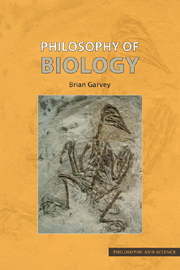Book contents
- Frontmatter
- Contents
- Acknowledgements
- Introduction
- 1 The argument in Darwin's Origin
- 2 The power of genes
- 3 Units of selection
- 4 Panglossianism and its discontents
- 5 The role of development
- 6 Nature and nurture
- 7 Function: “what it is for” versus “what it does”
- 8 Biological categories
- 9 Species and their special problems
- 10 Biology and philosophy of science
- 11 Evolution and epistemology
- 12 Evolution and religion
- 13 Evolution and human nature
- 14 Biology and ethics
- Notes
- Further reading
- Bibliography
- Index
Introduction
- Frontmatter
- Contents
- Acknowledgements
- Introduction
- 1 The argument in Darwin's Origin
- 2 The power of genes
- 3 Units of selection
- 4 Panglossianism and its discontents
- 5 The role of development
- 6 Nature and nurture
- 7 Function: “what it is for” versus “what it does”
- 8 Biological categories
- 9 Species and their special problems
- 10 Biology and philosophy of science
- 11 Evolution and epistemology
- 12 Evolution and religion
- 13 Evolution and human nature
- 14 Biology and ethics
- Notes
- Further reading
- Bibliography
- Index
Summary
When I was at primary school, the teacher set my class an exercise of classifying a miscellaneous collection of objects into “alive”, “dead” and “never alive”. The second group included objects made of wood, paper and leather, and the third included ones made of metal and stone. Even at that early age – we must have been about six at the time – there was no perceived problem in assigning the objects to their various categories. Seeing things as living or non-living seems to be a basic component of our experience. We somehow have a gut feeling that there is an absolute difference between living things and non-living things.
The theory of evolution, however, rides roughshod over this gut feeling. For it leads to the conclusion that the processes going on in living things, and the processes by which they are created, are fundamentally the same as the processes going on in the non-living physical world.
Philosophy of biology can be considered a part of philosophy of science. Very broadly, we might say that philosophy of science deals with questions that arise from science, but are not themselves scientific questions. But this statement needs to be qualified. First, philosophy of science is not the same as history of science or sociology of science, both current growth areas. Nor is it, much, concerned with the ethical questions that arise because of science.
- Type
- Chapter
- Information
- Philosophy of Biology , pp. xi - xivPublisher: Acumen PublishingPrint publication year: 2007

